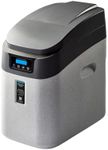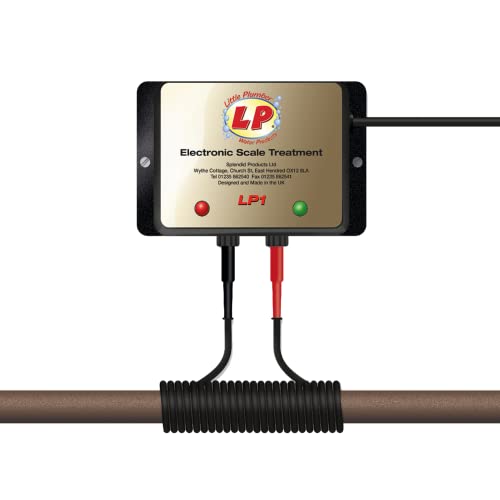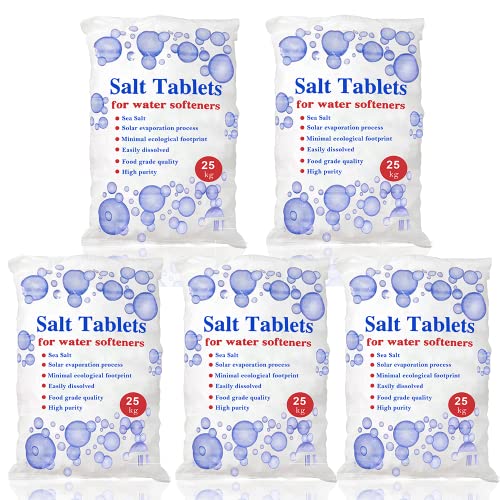Best Water Softeners
From leading brands and best sellers available on the web.
MAC Marie & Adam's Collection your comfort is our ambition....
25 Kg Salt Tablets | Water Softener | Food Grade | Compatible to All Water Softner Machines 100% Genuine British water softener salt tablets 25kg, Salt Tablet 1 pack

Water2BUY
Water2Buy Easy W2B800 Water Softener, Hi Flow Electronic Demand/Up to 1-10 People – Filtered Soft Water 3680 litres/Day, NSF/FDS/ISO9001 & 14001 Certified,100% Limescale Removed/App Reminder for Salt

Water2BUY
Water2Buy Easy W2B200 Water Softener, Hi Flow Electronic Demand/Up to 6 People – Filtered Soft Water 1250 litres/Day, NSF/FDS/ISO 9001 & 14001 Certified, 100% Limescale Removed/App Reminder for Salt

Monarch Water
Monarch Water Ultimate Midi HE WRAS-approved Water Softener Includes 15mm Hoses, Suitable for up to 6 people

Tapworks
Tapworks NSC11PRO Water Softener Easyflow Metered - Full Installation Kit +Hoses

Water2BUY
Water2Buy Easy W2B180 Water Softener | Efficient Digital Meter Softener for 1-6 People | 100% Limescale Removed

BWT
13%OFF
BWT WS355 Standard Electronic Water Softener, Blue, 14 Litre

BWT
BWT WS455 Hi Flow Electronic Demand Block/Tablet Water Softener, Blue, 10 Litre

iSpring
iSpring WCS15KG Water Softener, Hi Flow Electronic Demand/15,000 Grain/100% Limescale Removed with Backwash Feature for Households, Up to 6 People, 9 Litre
 Andre Speransky
Andre SperanskyWater Softeners for Better Water Quality
If you live in an area with hard water, you’ll notice limescale accumulate in your tea kettle or coffee maker. If you just let the limescale accumulate, you’ll notice that the coffee maker will start to take longer to boil. That means that you should descale the appliance regularly. But it doesn’t stop there: hard water sediments will also affect your boiler, your washing machine, and your dishwasher. Even though hard water has some health benefits (your body can get some extra calcium and magnesium by drinking hard water), it’s not good for the appliances in your home that heat water.
Fortunately, there are water softeners on the market that filter out the calcium and magnesium carbonates from your water. You’ll see electronic water descalers, reverse osmosis filters, and salt-based water softeners. We’ll go through some of the options, to help you decide what’s best for you.
Types
-
Salt-Based (Ion-Exchange) Water Softeners: In these units, the hard water runs through resin beads, which attract the calcium and magnesium deposits, and exchanges them for sodium salt, which dissolves easily and doesn’t form deposits. But this type of softener requires regular maintenance, where you have to provide salt in the form of pellets, crystals, or blocks, to replenish the resin beads’ ability to filter out the calcium and magnesium.
-
Salt-Free Water Softeners: Although the salt-free systems are quite expensive, they tend to save you the additional cost in the long run as you wouldn't have to be adding bags regularly. One of the features of this softener is that it removes bacteria as well as chemicals from the water. Also, it should be made known that these systems neutralize the hard minerals from the water.
-
Portable Water Softeners: These are ideal for travelers in an RV, boat, or small house. You can use regular table salt to regenerate the sodium ions in the unit, and it usually doesn’t require any electricity for operation. An example is the On The Go Portable Water Softener.
On The Go Portable Water Softener
-
Shower Head Water Softeners: These softeners are designed to supply the entire area of a house with soft water. They use cartridge filters and they are very easy to install. Also, some of these shower heads have vitamin filters that can benefit your skin as well as your hair.
-
Reverse Osmosis Water Softeners: Although they are pricey, these filters produce water that is very healthy to drink, most especially when you factor in that minerals are re-introduced. They work on a filter that must be replaced annually.
What Reviewers Have to Say
The following are comments on what people think when using a water softener.
-
Great to use: Nothing feels good like drinking water that is clean of bacteria and chemicals.
-
Easy to install: Most of these water softeners are quite easy to install, only requiring you to hook them up to the water main into your home.
Important Features
-
Carry out a regular inspection on the water softener: You should have your water softener serviced by a professional on a periodic basis. Regular check-ups would help you detect any faults that may occur in the functioning of the device.
-
Check the salt level: This is one of the important tips that shouldn't be forgotten. Check the salt level to detect if it is exchanging ions properly. By early detection, you can prevent hard water from forming.
-
Ensure to use the right salt: This is another feature that shouldn't be neglected. For salt-based water softeners, make sure that you use salt in the correct form to replenish the device’s sodium ions, using either crystals, blocks, or cubes.
Top-Rated Brands
-
General Electric (GE): This American company has an established reputation. Although their water softeners have the smallest capacity range when compared with other top brands, nonetheless they are very efficient in what they do.
-
Aquasana: This brand is well known for its water filtration. They are well known to reduce not only the chemicals that are found in your water but also the contaminants.
-
Whirlpool: This brand has been around for over 30 years. Their water softeners are capable of processing water ranging anywhere from 18,000 grains per gallon (=gpg) to 48,000 gpg (for comparison, very hard water is defined to have 10.5 or more gpg).
-
Eddy: They focus more on electronic water descalers, even though the minerals found in your water are not removed. One good thing is that they are not only cheaper when compared to salt softeners, but also they are smaller. Another interesting thing about this brand is that although they meet IS standards, they are still manufactured in the UK.










